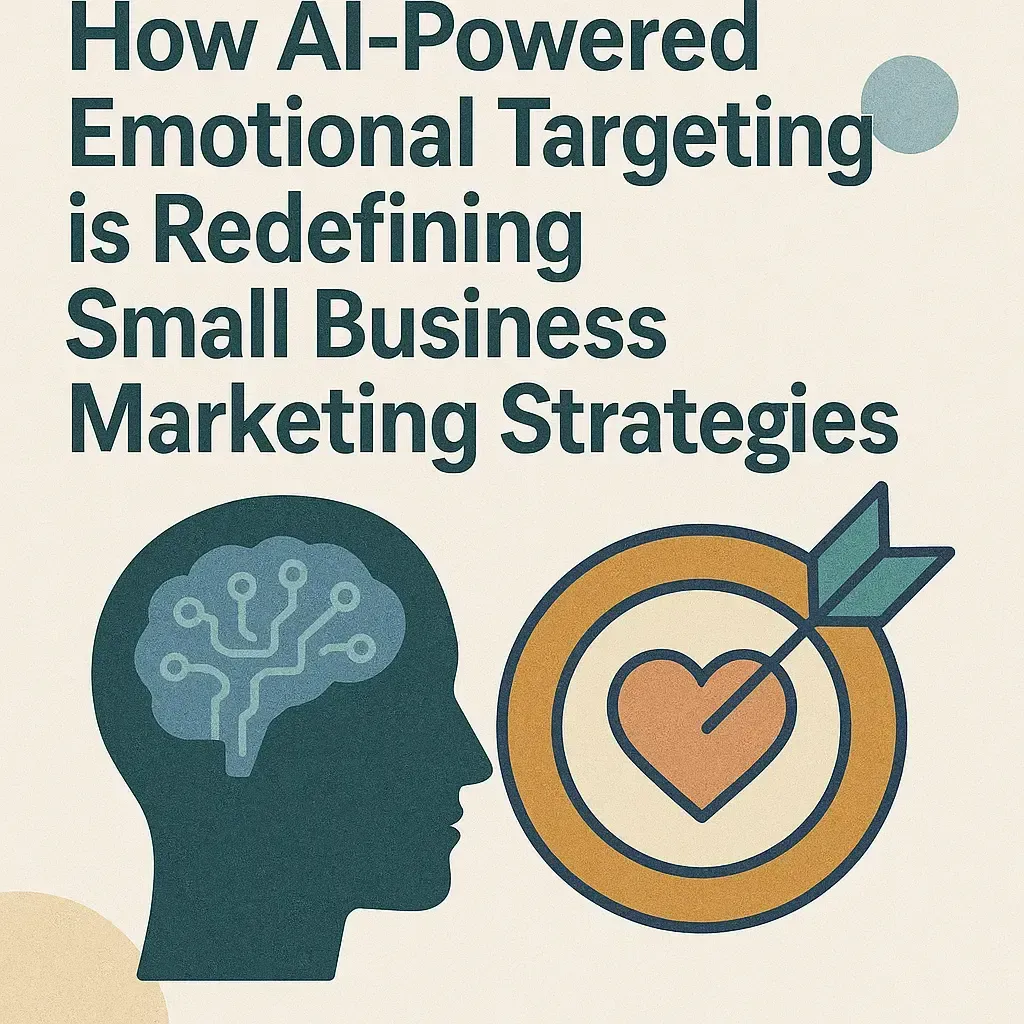
How AI-Powered Emotional Targeting is Redefining Small Business Marketing Strategies
How AI-Powered Emotional Targeting is Redefining Small Business Marketing Strategies
In a world where grabbing attention is no longer enough, emotional connection is the holy grail of modern marketing. For small businesses, understanding the “why” behind a customer’s decisions has always been a challenge. Now, AI-powered emotional targeting is stepping in as the game-changing tool to bridge that gap, reshaping how SMBs approach marketing. In this blog, we’ll explore the transformative power of AI emotional analytics and how it’s enabling small businesses to create deeper, more personalized connections with their audiences.

What is AI-Powered Emotional Targeting?
AI-powered emotional targeting leverages artificial intelligence to decode human emotions. Through algorithms that analyze facial expressions, voice tones, word usage, and even micro-behaviors, AI can predict emotional states and preferences. Tools like Affectiva (https://www.affectiva.com/), Human API (https://www.humanapi.co/), and IBM Watson Tone Analyzer (https://www.ibm.com/watson/services/tone-analyzer/) have paved the way for businesses to access this technology efficiently.
For small businesses, this means stepping away from cookie-cutter campaigns and leaning into hyper-relevant and audience-specific storytelling that moves the needle on conversions.
Why Emotional Targeting Matters for Small Businesses
Let’s face it: most SMBs don’t have Fortune 500 marketing budgets. Competing with corporate giants may seem impossible, but in marketing, personalization continues to be the great equalizer. Research by Epsilon reveals that 80% of consumers are more likely to make a purchase when brands offer personalized experiences (https://www.epsilon.com/us/insights/trends-and-data/personalization-statistics-2023).
With AI-powered emotional targeting tools, small businesses can now tap into personal cues that were previously out of reach. Imagine being able to gauge your customers’ true emotions through interactive surveys, social media interactions, or chatbots—all without hiring an expensive market research firm.
For example:
- A local coffee shop can use AI to determine how customers feel about their latest seasonal menu suggestions. Armed with that insight, the café can refine its offerings with emotional resonance.
- An online boutique can use emotional analysis to discover why certain apparel items are left abandoned in carts.
Emotional targeting doesn’t just sell—it connects. And connections drive retention.
Key Benefits of Emotional Targeting for SMBs
1. Enhanced Personalization
In 2023, personalization isn’t a luxury—it’s a necessity. Consumers are no longer responding to “one-size-fits-all” messages. Leveraging AI tools like Replai (https://replai.io/) or Adobe’s Sensei AI (https://www.adobe.com/sensei.html), businesses can create segmented campaigns that resonate with customers’ current emotional states.
2. Improved Customer Experience
A report by PwC shows that experience is king—73% of customers prioritize experience over price (https://www.pwc.com/gx/en/industries/consumer-markets/consumer-insights-survey/customer-experience.html). By predicting emotional reactions, businesses can make smarter adjustments to their touchpoints, whether that’s tweaking website user journeys, email copy, or even chatbot responses.
3. Smarter Ad Targeting and Spending
Traditional ad targeting often wastes resources on uninterested audiences. With AI emotional analytics, campaigns become laser-focused. For instance, with platforms like Adoreboard (https://www.adoreboard.com/), small businesses can fine-tune their paid ads to trigger emotional responses that lead to action, maximizing ad spend ROI.
4. Brand Loyalty
Customer emotions dictate loyalty. AI tools monitor competitor sentiment via social listening, helping you pivot faster. Platforms like Brandwatch (https://www.brandwatch.com/) can provide emotional sentiment analysis across your customer reviews and conversations. Loyal customers lead to recurring revenue—a critical lifeline for SMBs.
Real-World Examples of Emotional Targeting in SMB Marketing
1. Birchbox
This small beauty subscription company uses AI emotional targeting to analyze customer sentiments based on survey inputs and subscription interactions. They adjusted their offers and messaging based on customer happiness indices, resulting in increased subscription retention rates.
2. Casper
This mattress startup uses emotionally compelling chatbot ads (nicknamed “Insomnobot”) that target late-night insomniacs. The chatbot engages with empathy, creating meaningful connections and driving purchase intent. Find out more here: https://www.casper.com/insomnobot.
3. Gili Sports
A paddleboard company with a mission focused on rescuing marine life saw engagement soar after incorporating emotionally resonant storytelling in their ads, backed by emotional data analysis from tools like Sprinklr (https://www.sprinklr.com/).
How to Get Started with AI-Powered Emotional Targeting
We get it—AI may sound intimidating. But starting small is the key to leveraging emotional targeting without feeling overwhelmed.
Step 1: Identify Key Emotional Touchpoints
Pinpoint where emotions are most likely to make or break decisions. For example, analyze abandoned carts for e-commerce or survey responses for service providers.
Step 2: Choose Easy-to-Use Tools
Look into beginner-friendly tools like Crystalknows (https://www.crystalknows.com/) for real-time emotion-based customer insights.
Step 3: Monitor ROI Closely
Start with small budget campaigns and monitor increases in retention, engagement, and sales metrics.
Step 4: Test, Iterate, Optimize
AI thrives on data. Always analyze what worked, what didn’t, and implement continuous improvements.
The Future of SMB Marketing is Emotional
As AI-powered emotional targeting evolves, small businesses now have a unique opportunity to humanize their digital strategies. Whether you’re a bakery, an IT service provider, or a fitness studio, understanding emotions can unlock new layers of connection with your audience.
The days of “is AI only for big companies?” are gone. By adopting emotional targeting, SMBs can finally compete on a level playing field—and win.
Ready to rethink your marketing strategies? The question isn’t IF your business should embrace AI—it’s HOW SOON can you start emotionally connecting with the people who matter most: your customers.
Ready to harness the power of AI?
Book a call today to learn how we can implement these strategies for your business:

